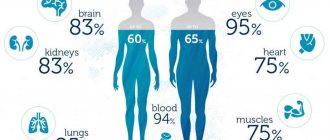How many calories should you consume to lose weight?
You can calculate your calorie needs in different ways: if there is little excess weight, then count immediately towards your ideal weight; if there is a lot, then count towards an intermediate goal. You can also calculate your current weight taking into account your calorie deficit. These methods are used in dietetics and are good in their own way. Knowing your ideal weight, it is easier to control your own volume and get rid of extra pounds, but it is easier to adjust your diet for your current weight. Choose a more convenient option for calculating your daily calorie needs.
Calorie calculation for target weight (if you are slightly overweight)
So, in order to achieve the ideal weight for you, you need to adhere to the daily amount of calories that is necessary to maintain your ideal weight.
What is your goal? ________ kg
Multiply this weight by:
- 27 – If you do not play sports at all and your work does not involve physical labor;
- 29 – If you occasionally play sports (maybe play tennis or swim in the pool on weekends);
- 34 – If you exercise regularly (swim, run or walk for half an hour to an hour at least 3-4 times a week);
- 37 – If you play sports almost every day and quite intensely;
- 42 – If you play sports every day and very intensely or are involved in heavy physical labor at work.
For example:
I want to weigh 70 kg. However, I don’t play sports. Then:
70 x 27 = 1890
That is, in order to weigh 70 kg I need to consume no more than 1890 kcal per day, while preferably moving or doing fitness every day.
Calorie calculation for intermediate target weight (if there is a lot of excess weight)
If you have a lot of excess weight, do not immediately set yourself a final goal, set intermediate ones. If you weigh 80 kg, then when calculating your daily calorie intake, focus on a target weight of 75 kg, even if your final goal is 50 kg. Accordingly, calculate the daily calorie intake for intermediate weight. Why do this? And so that there is room to reduce calories further. Imagine you have reduced your calorie intake to your ideal weight. For the body, this is a lot of stress, starvation. Of course, at first he will give well, but very soon he will decide that he himself needs fat, and will not only stop losing weight, but will also go into saving mode. Therefore, you need to consume your daily calorie intake at your ideal intermediate weight.
Calorie calculation based on actual weight
There is also the option of consuming calorie intake based on your current weight with a calorie deficit of 10-15%. That is, you calculate the calorie intake based on your current weight:
How much do you weigh now? ________ kg
Multiply this weight by:
- 30 – If you lead a sedentary lifestyle (at home, office work, home again);
- 31-37 – If you train 3 to 5 times a week (gym training, group classes). The more often and more intensely you train, the higher the number you choose;
- 38-40 – If you lead an active lifestyle (work out daily or your job involves physical activity);
- 41-50 – If you play sports 15-20 hours a week or your job involves heavy physical labor.
The resulting figure must be adjusted taking into account the goal. If the goal is to lose weight, then subtract 10-15% from it.
For example:
I weigh 70 kg and go to group classes three times a week. Then:
70 x 31 = 2170
2170 — 10% = 1953
That is, if I now weigh 70 kg, then I need to reduce my calorie intake by 10%, which will be no more than 1953 kcal per day.

Recommendations for calculating calories for current weight
Nutritionists advise first focusing on a deficit of 10%, but switching to proper nutrition, excluding sweet, fatty and starchy foods from the diet. As mentioned above, at the beginning of losing weight, the body willingly gives up weight, but then the process slows down. By starting to lose weight with a 10% deficit, you will give yourself some wiggle room in case your weight loss slows down.
Which way is better?
Each method has its supporters. Calculating your target weight allows you to always stay focused on losing weight and not overeat. And calorie content calculated for actual weight is easier to adjust - you may not reach the target weight when the actual weight allows you to more accurately determine the current needs of the body.
How to correct results
If you are not losing weight with the calculated amount of calories, reduce your daily diet by 100 calories and increase physical activity by the same amount. Monitor your weight in this mode for a week. If you have at least 100-200 grams of “plumb”, stay another week in this mode and so on until the weight stays the same for 2 weeks in a row. Why two weeks and not one? Yes, because in the first week, maybe you just ate something extra and didn’t notice, or some other physiological factor influenced it, etc.
Be honest with yourself, keep a weight loss diary, track your caloric intake and try to be more active than you are now. Read food labels more carefully. As a rule, information is given for 1 serving or per 100 grams. Compare this to how much you actually consumed, perhaps 2 or more servings.
After two weeks, you can again apply the “reduce your daily diet by 100 calories and increase physical activity by the same amount.”

Why can't you lose weight quickly?
Remember that you cannot lose weight quickly, especially for those who are severely obese. Why? Yes, because with obesity, our internal organs are often also lined with fat, which supports them. If you lose weight slowly - 2-4 kg per month, then your organs will quietly release fat and nothing terrible will happen, they will feel better. If you lose weight suddenly, the fat support for your organs will disappear abruptly and you may experience organ prolapse. It's very scary. Don't let this happen.
Author: Ekaterina G. (nutritionist, fitness blogger) (especially for) Copying this article in whole or in part is prohibited.
How to calculate deficit correctly?
In order to understand how many calories to consume per day for weight loss, you need to know how much a person spends. After all, the effectiveness of the diet as a whole depends on this factor. Since the same number of calories for a person leading an active lifestyle or sitting in the office for days should be different.
To calculate calorie consumption per day, you need:
- Calculate your own net weight without fat.
- Next, using daily physical activity data, calculate your approximate consumption.
Example: for a person weighing 75 kilograms and involved in sports versus a person weighing 75 kilograms leading a sedentary lifestyle, the calorie calculation will differ by approximately 35%. So, the first one will need to take into account calorie consumption during sports (about 700-1000 kcal on average). And his net weight due to the low fat layer will be much higher. A person who does not play sports will have less net weight, and the lack of expenditure on training will force him to cut back on his diet significantly more. The consumption will be carried out with a small error, because... All tables located on the Internet are only approximate.
Only after calculating the calorie consumption can you begin to create a diet.
For men
Calculating caloric intake and expenditure per day is a very difficult and not always accurate task. Therefore, everything is always done by trial and error. However, we can take the research of American scientists as a basis. They calculated that in a day (without training) an average man with a total weight of 75 kilograms and 25% body fat spends 3000 kcal per day. Based on these data, we calculate the calorie consumption per kilogram of net weight. This works out to 53 kcal per kilogram. This means that to create a deficit, men will need to create a 10% deficit (48 kcal per kilogram), from which the total calorie intake is calculated. On training days, you can add an additional 500-600 kcal, which are spent during training.
For women
Using the same studies, the researchers calculated that a 70-kilogram woman with a body fat percentage of 25% expends 2,500 kcal. This means that women spend about 47 kcal per kilogram of weight. Counting incoming food is similar. Calculate your net weight, create a 10% deficit, add 300-500 kcal on training days.
Nutrient consumption during kilocalorie deficit
Separately, it’s worth briefly going over the consumption of nutrients when creating a calorie deficit. With a properly composed menu and a slight calorie deficit, everything depends solely on the frequency of meals and the presence of exercise.
Case 1: A person slightly reduced caloric intake and exercises
In this case, good and high-quality weight loss is guaranteed, albeit at a not very fast pace. Sports and a slight reduction in calories reduce glycogen reserves, meaning that the incoming energy goes not into the fat depot, but into the muscles. As for the fat itself, due to a slight deficiency, it is actively consumed during training immediately after the complete depletion of glycogen. Proteins are involved in active muscle building.
Case 2: A person has significantly reduced caloric intake and is exercising
In this case, you can provide rapid weight loss results, after which it will slow down. In the first 2-4 days after cutting calories, the body will, by inertia, consume fat tissue. When the amount of energy is not renewed, the process will take a slightly different path. There will be a decrease in muscle mass (as the main energy consumer) and a decrease in metabolic rate. In this case, the incoming proteins and fats will not be used to create an anabolic background, but will be directly stored in the fat depot. This diet will allow you to lose weight only in short periods (up to 6 days).
Case 3: A person has slightly reduced calories and does not exercise
Nothing will happen. Since glycogen reserves are depleted very slowly, the body will simply begin to convert proteins and fats into energy to compensate for the deficiency. With a greater deficiency, the metabolism will slow down.
Case 4: A person slightly reduced calories and increased the number of meals
Every time after eating, the hormone insulin will open transport cells and release excess energy. If it is spent, then the person will get rid of excess fat, if not, then before the cells close, the energy will be converted back into fat. Painless but low-speed weight loss. By increasing the metabolic rate.
Case 5: A person significantly reduced calories and increased the number of meals
With a large deficit, the body with an accelerated metabolism will burn all the energy (which is required to maintain vitality), and both muscles and adipose tissue will be used. The fastest way to lose weight, often used by women who are not interested in maintaining muscle tissue. Ineffective for athletes due to the possibility of losing shape and performance. Proteins are used to replenish energy, and not to build tissue.












